'Overweight' or 'obese' BMIs may be completely wrong, scientists say
Share:
Millions of people are being “overdiagnosed” as overweight or obese as scientists say there are problems with the main BMI measure. Body mass index has long been used to categorise people but needs a “radical overhaul” according to 50 experts from around the world on a new Lancet Commission. BMI divides a person's weight by the square of their height and currently shows around two thirds of adults in Britain are overweight or obese.
But some people with bigger frames may be very active and have no ill-effects of their weight but are still classified as obese while others may be suffering significant harm such as problems with their internal organs. Meanwhile other experts said around one in ten “lean” people may be “metabolically obese”.
Professor Francesco Rubino, chairman of the commission and chairman of metabolic and bariatric surgery at King's College London, said: "Some people who are today classified as having obesity by BMI but they might play sports, they're very active, they might have very strong bones - saying that those people have obesity and then classifying them as having a disease would obviously be an overdiagnosis.
“Everybody has been using the old classification for four decades but we are calling for a change, a radical change, because obviously, in the context of one billion people being classified as having obesity in the world today, and with a number that is projected to increase, no country is rich enough to be able to afford inaccuracy in the diagnosis of obesity.".






















